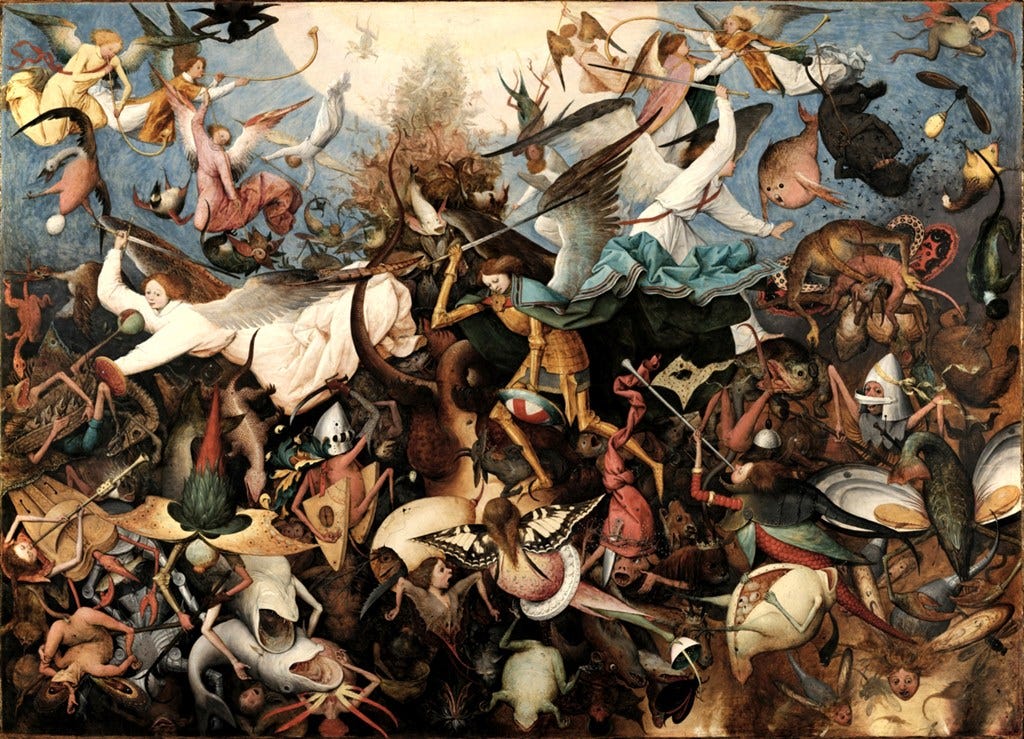Men of the Name
Almost every other translation offers "men of renown" or "famous men", but I’m not entirely alone in my choice. The 16th C. Spanish Calvinist Casiodoro de Reina gives us "varones de nombre".
Genesis 6:4 tells of the אַנְשֵׁ֥י הַשֵּֽׁם / οἱ ἄνθρωποι οἱ ὀνομαστοί / viri famosi, which I translate as men of the Name. My rendering is extremely “literal”; הַשֵּֽׁם means “the Name”. It’s also mysterious, just as these men are mysterious. Almost every other translation offers instead men of renown or famous men, but I’m not entirely alone in my choice. The 16th C. Spanish Calvinist Casiodoro de Reina gives us varones de nombre.1
Modern Spanish translations use renombre instead, which, like the Greek ὀνομαστοί, is an elegant way to combine the original sense of name with the idea of renown or fame. The Latin famosi is interesting because it is ambiguous. It can mean renowned or notorious.
הַשֵּֽׁם is also interesting because it’s used by post-biblical Jewish writers as a stand-in for the tetragrammaton. It’s also simply a name (see: 1 Chronicles 11:34). While I don’t think it’s being used here to refer to the tetragrammaton (or someone like Hashem the Gizonite!), at least not in a direct way, words contain their whole history, and every translation and commentary and scribal error is part of the text. Or part of the grand Text. God is not constrained by Time.
Our friends can help us with the verse:
Rashi:
אנשי שם MEN OF RENOWN (literally, men of name) — Men who bore distinctive names: עירד, מחויאל, מתושאל being so named because these names have reference to their destruction, for they were wiped out and torn out from the world (מחוי-אל would signify “wiped-out-by-God”, מתושאל “Torn-out-by-God). Another explanation is that they were men of devastation (אנשי שם-מון) — who devastated the world.2
This same note by Rashi, translated by Michael Carasik:
The men of renown. Rather, “the men of name,” the descendants of Cain who are named in 4:18, Irad, Mehujael, and Methusael, whose names indicate how they perished: They were “uprooted” (Methusael), “driven off” (Irad), and “wiped out” (Mehujael). Another reading: not just men of shem (“name”) but of shemamon, “destruction,” for they destroyed the world.3
Rupert of Deutz:
Those who are the mighty ones of old or men of renown are rightly called “falling,” that is, exalted. For to exalt oneself is to fall, as it says in the Psalm [82:7]: “But you, like humans, shall die, and you will fall like one of the princes.” Otherwise, if one chooses to understand giants in terms of great height, how could the intermingling of the sons of God and the daughters of humans produce a different nature, so that humans of amazing height would be born? So giants, or exalted ones, would be exalted since they came from a prominent people on both sides, that is, both the race of Seth and the race of Cain. Absalom had an exalted nature because his blood was derived from two kings. For his mother Maacah was the daughter of Talmai, king of Geshur (2 Sam. 3:3). But also Ishmael, though he was illegitimate, due to his mother’s clan, nevertheless drew his mixed bloodline from two peoples—Hebrew on his father’s side and Egyptian on his mother’s side—and was a “mighty one of old, a man of renown,” that is, a “wild person” (Gen. 16:12) or “exalted one.”4
St. Didymus the Blind:
While, in presenting giants, authors who are not of the faith do so from fairy stories, in sacred Scripture the term designates (36) strong men. In Isaiah, for instance, when God threatens to do away with their assets since they deserve it, he includes “a giant and a strong man” among what is being done away with. Scripture also gives that name to Goliath in testifying that he was a strong warrior. As well, when Moses made mention of the spies sent into enemy territory, they said of the place, “We saw sons of giants there,” and then in commenting on their size they said, “And we were like grasshoppers before them,” this being his testimony to their enormous size. If it was said before that demons used as instruments people in thrall to passion, you could claim that it was proof of their bodily condition that such big offspring were born to them, given the name people of renown from of old, the phrase of old suggesting that the tradition of their enormous size was of longstanding. If, on the other hand, you were to say that they were called giants on account of the vileness of their life, the view would not be unreasonable, since it was in their viciousness that they generated those subject to them and encouraged them to outrageous villainy.5
Señor de Reina used as a primary textual source the Ladino Ferrara Bible, which puts forward varones de la fama.
See also: Genesis Rabbah 26.
Michael Carasik, ed., Genesis: Introduction and Commentary, trans. Michael Carasik, The Commentators’ Bible (Philadelphia: The Jewish Publication Society, 2018), 63–64.
Rupert of Deutz, “On the Trinity and Its Works: Comments on Genesis (Genesis 4–8)”, The Book of Genesis (ed. J. A. Schroeder et al.) (The Bible in Medieval Tradition; Grand Rapids, MI; Cambridge, U.K. 2015) 104.
Didymus the Blind, Commentary on Genesis (The Fathers of the Church; Washington, D.C. 2016) CXXXII, 146-147.




